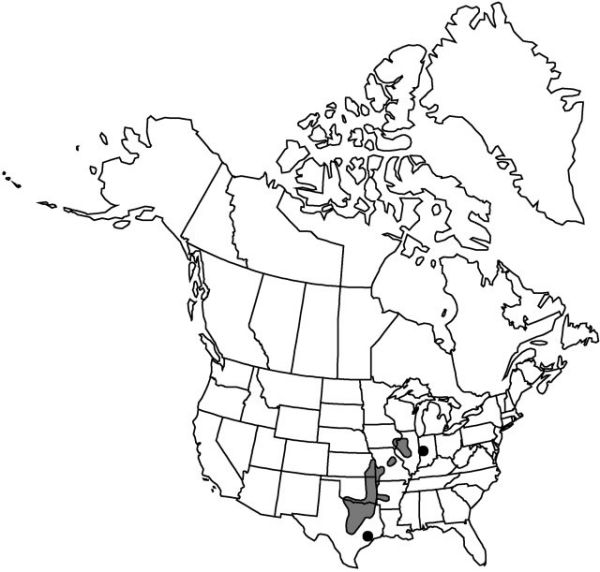Difference between revisions of "Camassia angusta"
Rep. (Annual) Missouri Bot. Gard. 18: 195. 1907.
Common names: Prairie camas
Endemic
Basionym: Scilla angusta Engelmann & A. Gray Boston J. Nat. Hist. 5: 237. 1845
Synonyms: Camassia fraseri var. angusta (Engelmann & A. Gray) Torrey Quamasia angusta (Engelmann & A. Gray) Piper
Treatment appears in FNA Volume 26. Mentioned on page 307.
FNA>Volume Importer |
imported>Volume Importer |
||
| Line 8: | Line 8: | ||
}} | }} | ||
|common_names=Prairie camas | |common_names=Prairie camas | ||
| + | |special_status={{Treatment/ID/Special_status | ||
| + | |code=E | ||
| + | |label=Endemic | ||
| + | }} | ||
|basionyms={{Treatment/ID/Basionym | |basionyms={{Treatment/ID/Basionym | ||
|name=Scilla angusta | |name=Scilla angusta | ||
| Line 60: | Line 64: | ||
|publication title=Rep. (Annual) Missouri Bot. Gard. | |publication title=Rep. (Annual) Missouri Bot. Gard. | ||
|publication year=1907 | |publication year=1907 | ||
| − | |special status= | + | |special status=Endemic |
| − | |source xml=https:// | + | |source xml=https://bibilujan@bitbucket.org/aafc-mbb/fna-data-curation.git/src/bb6b7e3a7de7d3b7888a1ad48c7fd8f5c722d8d6/coarse_grained_fna_xml/V26/V26_604.xml |
|genus=Camassia | |genus=Camassia | ||
|species=Camassia angusta | |species=Camassia angusta | ||
Revision as of 22:19, 27 May 2020
Bulbs sometimes clustered, globose, 1–3 cm diam. Leaves 3–11, 2–6 dm × 5–20 mm. Inflorescences 27–87 cm; sterile bracts 3–19(–28), bracts subtending flowers shorter than or equaling pedicel. Flowers actinomorphic; tepals withering separately, sometimes connivent over capsules, light blue to lavender, each 3- or 5-veined, 6–10 × 2.2–3.6 mm; anthers bright yellow, 1.5–2 mm; fruiting pedicel incurving-erect, 6–12 mm. Capsules deciduous, pale green to light brown, ovoid-ellipsoid, 6–10 mm. Seeds 2–5 per locule. 2n = 30.
Phenology: Flowering mid–late spring.
Habitat: Prairies
Elevation: 100–500 m
Distribution

Ark., Ill., Ind., Iowa, Kans., Mo., Okla., Tex.
Discussion
Camassia angusta flowers two to three weeks later than sympatric populations of C. scilloides.
Selected References
None.
Lower Taxa
None.